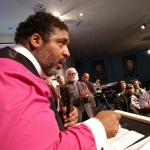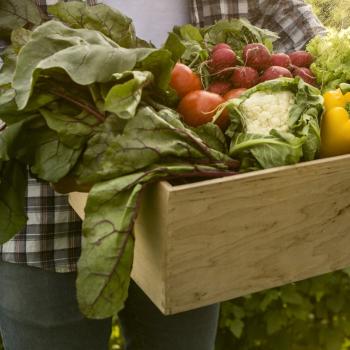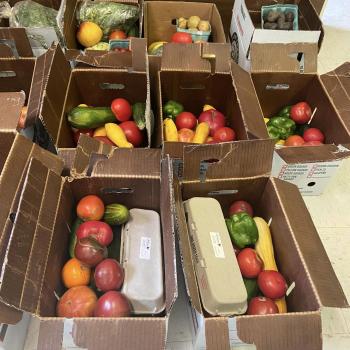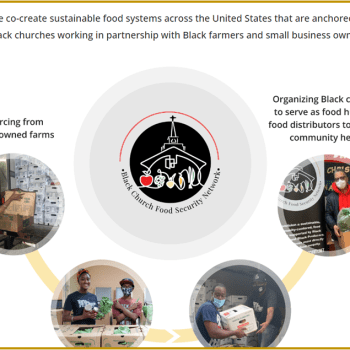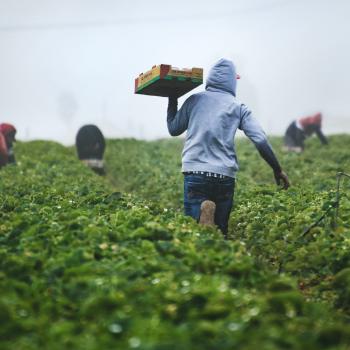The 7-Day Vegan Challenge was indeed a challenge for me. Not because I couldn’t go a week without consuming animal products – that part was easy and tasty. It was because of the flack and shaming I received from meat-eaters and vegans alike. And because I learned just how difficult it is to be an ethical eater in the United States. But at the end of the week, I was surprised by a dollop of grace.
[This is Day Seven of my week-long devotional for the 7-Day Vegan Challenge. You can read about why I’ve undertook this break from all animal products here.]
Scripture
“But law came in, with the result that the trespass multiplied; but where sin increased, grace abounded all the more” (Romans 5:20).
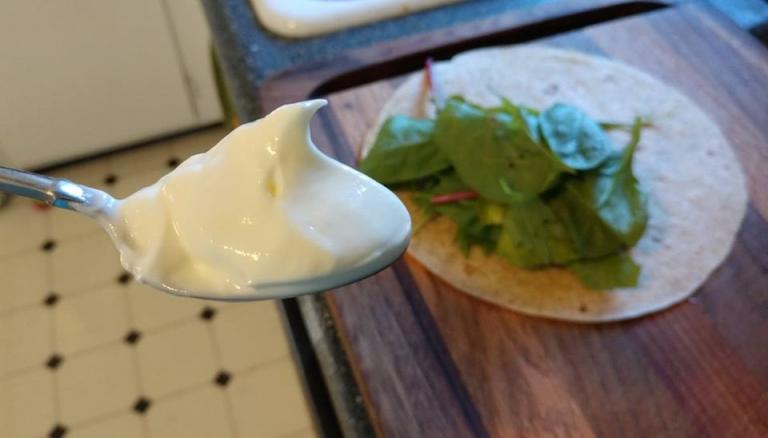
Reflection
As I neared the end of my vegan week, I talked about my ethical-eating dilemma with some wise friends and colleagues. My friend and fellow instructor at Lexington Theological Seminary, Wilson Dickinson (also the director of our DMin program), is writing a book tentatively titled: The Green Good News: Christ’s Path to Sustainable and Joyful Life. He frequently talks with me and other members of our seminary’s Green Task Force (GTF) about the connections between food, faith, ethics, and justice. He reminded me that an exercise like this reveals just how broken our food system is. And, he pointed out, it works very well for the system when I feel guilty for the lack of options for ethical eating:
“Our whole culture is based on hyper-individualism. So it’s all on you to find ethical solutions, when really it’s a system-wide problem that existed before you got started, and is more powerful than you will ever be on your own.”
So what am I supposed to do?
“That’s exactly the wrong question,” he responded. “The question should be, ‘What are WE going to do?’ This has to be a community-based overhaul of our entire system. You have to keep the long game in mind. You won’t solve this all by yourself.”
He’s right, of course. That’s why he works on community building through local gardens in low income areas and stresses the importance of making connections between urban and rural citizens around food issues. An “experiment of one” is doomed to fail on its own. An “experiment of community” can plant seeds of real change.
Yet the conversation left me unsettled as to where I go from here. There’s still shame and guilt, even knowing that it’s not all my fault. Where is the grace in all this?
Then I came home on a Sunday afternoon to find my teenage daughter had made me her specialty – a meatless crab-cake wrap using Gardein’s vegetarian crab balls (which are delicious). I didn’t ask her to do it. She made it all on her own without my prompting. She crisped the crab balls in the toaster oven, shredded the carrots and chopped up the basil, and tucked it all into a warm tortilla wrap. But she had added a dollop of sour cream to the mix.
What was I going to do? Refuse what she was offering because I was still on my vegan week? Any parent will tell you – when your teenager takes it upon themselves to think of you and do something nice for you, you receive it with gratitude. There was grace on my plate, right in front of my eyes.
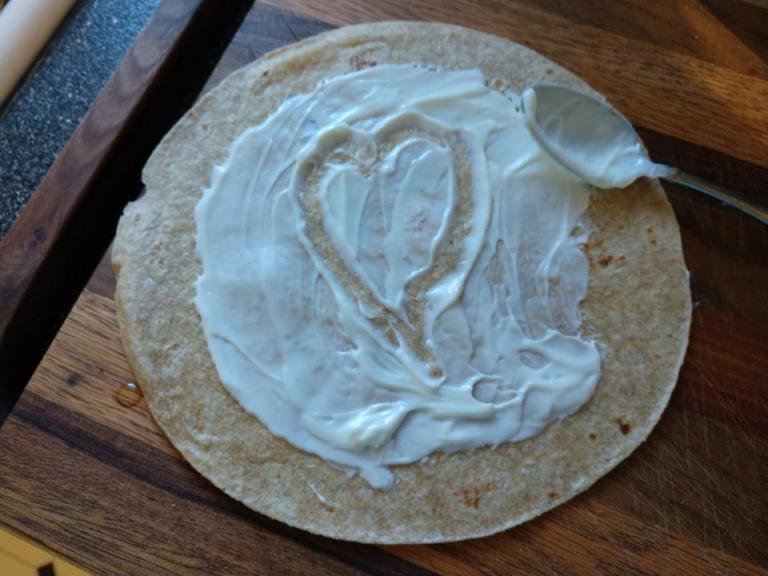
So where do I go from here?
My friend and colleague, Emily Askew, who invited me to undertake the Vegan Challenge with her, reminded me that her original request to our GTF was to commit to eating lower on the food chain for a month. What that looks like for you will be different than it does for me. If you eat meat three meals a day, commit to going meat-free for one meal. If you eat meat every seven days, commit to a Meatless Monday, or some other day of the week. If you’re pescetarian, go a week each month without eating fish. If you’re a lacto-ovo vegetarian, commit to eating vegan one meal, or one day, or one week a month. If you’re a vegan, commit to eating a meal only from local foods once a month, or once a week. In fact – we all can do that and support local farmers.
Will any of this be enough to satisfy the most zealous vegans? Doubtful. Will it be enough to curb climate change? Probably not. But a friend once reminded me:
Don’t let the fear of imperfection keep you from doing good.
Doing something is better than doing nothing.
Most importantly, be mindful of your food choices. Think about what you’re eating, where it comes from, who grew it, who suffered for it, what it cost to bring it to your table in terms of plastics, chemicals, and fossil fuels. Don’t just mindlessly consume. Think about how all of us, collectively, can advocate for changes that begin to alter the agricultural and fishing industries so that our eating can be done with less guilt and more joy.
So what did I learn?
I learned that I can live without fish and seafood (I had already given up meat three years ago).
I learned how to cook spaghetti squash, and tofu, and rice noodles.
I learned that I can be satisfied on a vegan diet.
But I also learned that I miss that dollop of sour cream, whipped cream, ice cream, or butter. And real cheese. But I need to limit that to a small portion of my diet, rather than as a staple.
And I learned that there’s such a thing as pasture-raised hens that lay eggs which I can enjoy on occasion. They are treated humanely, are not forced to lay eggs in artificial environments, and are not slaughtered when they fail to produce.
I learned that there’s such a thing as farmers who raise cows humanely for their milk. They’re not in CAFOs, and they’re not slaughtered. The products are more expensive. But because I can be satisfied with less, I can enjoy an occasional dollop.
I also learned that eating lower on the food chain made a real difference in my health, along with regular exercise. My doctor administered a blood test at the end of my 7-Day Vegan Challenge. My total cholesterol dropped 36 points, and my LDL (the bad cholesterol) and Triglycerides also dropped significantly from the last time I was tested a year ago. So I have personal incentive to eat vegan as much as I can.
But I also learned that sometimes grace comes in that dollop of sour cream offered by a teenager on a Sunday afternoon. And I can receive that grace with gratitude.
Prayer
God of Creation:
For the plants that make food for me from mere air, sunlight, water, and soil – thank you.
For the animals that I have harmed through my eating – forgive me.
For the people who I have harmed through my eating – forgive me.
For the community of friends and family who hold me accountable, and also hold me with grace – thank you.
For all you have created, and all that you are creating within me, and us, and all around us – thank you.
Amen.

Leah D. Schade is the Assistant Professor of Preaching and Worship at Lexington Theological Seminary (Kentucky) and author of the book Creation-Crisis Preaching: Ecology, Theology, and the Pulpit (Chalice Press, 2015). She is an ordained minister in the Lutheran Church (ELCA).
Twitter: @LeahSchade
Facebook: https://www.facebook.com/LeahDSchade/.
Read also:
7-Day Vegan Challenge: A Week No Animals Will Suffer By My Menu



